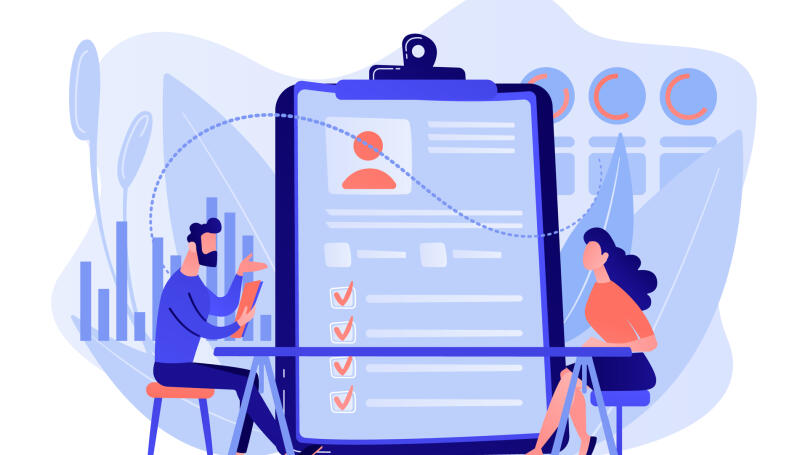Negotiate a high salary at a job interview in three steps
Writing an eye-catching CV that draws the attention of a potential employer is just the first thing you must do to get work towards the job offer of your dreams. On top of that, you have to pass a series of interviews with company representatives.

In today's volatile and unpredictable world, the level of complexity of interviews with recruiters has significantly increased. Candidates are expected to have strong professional skills and a robust set of soft skills, a vast network of professional connections, and an understanding of how related niches function.
What does the average job interview look like today?

Firstly, it has become several times more challenging to get an interview for a competitive position. The criteria for selecting specialists are changing, and the requirements for candidates are growing exponentially. Everyone is now looking for multi-specialists. For example, a fantastic marketer can set up targeting or edit spectacular Instagram posts on their own if necessary, thereby taking over some of the SMM functions.
Secondly, the interview now looks less like a questionnaire and more like a conversation between two equal specialists. You can hire a simple manager through a standard five-minute "tell us a little about yourself" interview, but non-linear positions require a more meticulous selection process. A challenging job is a tough interview! The principle of "sell yourself at best but reasonably costed price" applies to the candidate here.
How do you negotiate the highest possible salary?

You must demonstrate that you understand the business goals of the company. It's also imperative to explain how you will achieve them and break the monotonous pattern of the typical job interview, which automatically makes you look boring. It's easy to say, but how do you pull it all off? Follow the recommendations below, and you'll be able to sell your expertise at your next interview for more than you planned:
- Speak the language of results. Don't say "participated in the project," but "with the help of this project, I increased the average buyer's cheque by 50%." Don't say "I worked in the company," but "during the year of my leadership, the department, consisting of fifty-five people, exceeded the KPI by 156%!" It is crucial to explain that you aren't guaranteeing a clear result rather than a workflow.
- Discuss the challenges you face. The recruiter has already read your resume, scrolled through your Facebook profile, or called your previous job for a recommendation. Now they want to know how you will help the company achieve their goals. If they are seriously considering you for the position, they are definitely going to tell you about your future responsibilities. Clarify precisely what results they require from you and what KPIs will you need to meet? How will this affect the overall performance of the company? What are the prospects for the company - and you too? Will you be involved in strategic planning, brand positioning, and other things?

- Don't bargain for a salary. Communicate what your financial expectations are in the format "The monthly salary I expect is between 75,000 ($979) and 85,000 ($1,110) Roubles." Discuss the possibility of increasing bonuses and benefits. That doesn't mean that right after they've told you what the salary on offer is, you have to throw in many questions. For example, "Will there be voluntary medical insurance?" "Will you pay for daycare, sick leave and a health club in the evenings?" How many days' annual leave do I get?" And so on. The position "higher result - higher bonuses" will be much more advantageous. Let's say you are required to increase the number of regular customers by 10%. Ask how the bonus part of your salary will change if your department gives out 15 per cent instead of 10 per cent? However, just in case, check the average salary for a specialist of your level in advance on aggregator sites like Glassdoor.
- Prepare for the interview in advance. Having refreshed your special knowledge, you will be able to successfully pass any interview and get the salary you can only dream of now. The online course "Finding a Job of Your Dreams: Complete Guide to Job Search" will help you analyse the job market, write your CV and cover letter correctly and answer the trickiest questions from recruiters.
Share this with your friends via:
Latest News

In the UK, £23 million has been allocated for the expansion of the EdTech Testbed program — pilots of educational technologies in schools and colleges.

In the US, Tuskegee University announced the launch of Tuskegee University Global Campus (TUGC) — a new online platform for distance learning.

A significant stage in the development of the alternative education system has begun in West Northamptonshire in the UK: the County Council is actively calling on parents, guardians, and trustees to participate in shaping the future of this key area.

Outwoods Primary School in Atherstone, Warwickshire, having experienced deep sadness after the loss of their famous cat, Silla, has found solace in a new pet – a Maine Coon named Aloysius O’Hara.

In modern universities, artificial intelligence, and in particular ChatGPT, is rapidly transforming from a controversial tool into a full-fledged student assistant.












 9 Career Mistakes Young Professionals Make
9 Career Mistakes Young Professionals Make
 £23 million allocated for the expansion of EdTech Testbed in the UK
£23 million allocated for the expansion of EdTech Testbed in the UK
 Tuskegee University launches Global Campus — a new online platform
Tuskegee University launches Global Campus — a new online platform
 Test: How Psychologically Mature Are You? Check Your Inner Foundation.
Test: How Psychologically Mature Are You? Check Your Inner Foundation.
 Test. Check Your Social Media Dependency Level!
Test. Check Your Social Media Dependency Level!
 Test: What Business is Right For You?
Test: What Business is Right For You?
